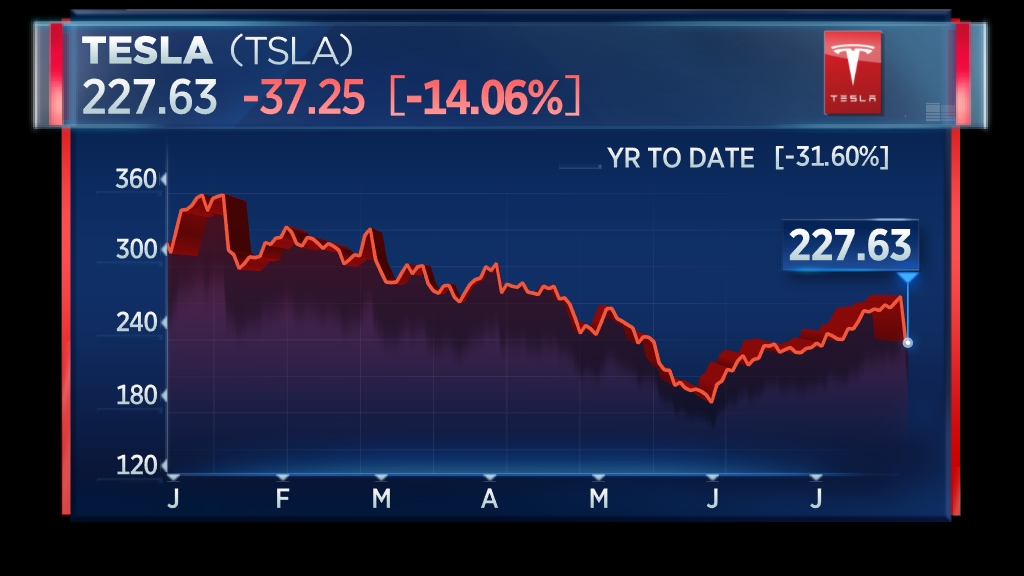Elon Musk
Mike Blake | Reuters
Tesla shares are headed for their steepest drop since 2013 after the electric carmaker reported a wider-than-expected loss and disappointing revenue and announced the departure of Chief Technology Officer and co-founder JB Straubel from the executive ranks.
The stock plunged 14% as of late morning on Thursday to $227.63. If it closes around that price it will be the biggest decline since November 2013.
The company says it has a weekly run-rate of 7,000 of its most popular Model 3 vehicles, and aims to be able to produce 10,000 Model 3s weekly by the end of 2019. But costs related to sales and servicing are also way up, weighing on profitability. Gross margin, or the money left from sales after subtracting costs of goods sold, fell to 14.5% from 15.5% a year ago.
“For the bulls this is a disaster story in terms of gross margin,” said Dan Ives, managing director of equity research at Wedbush Securities, on CNBC’s “Closing Bell” on Wednesday. “You can sell more cars — can you do it profitably? If not, ultimately this company will have to raise more capital next year. That’s why it’s such an issue for the Street.”

During the call with analysts after the report, CEO Elon Musk dropped another bombshell when he announced that Straubel was moving from CTO to an advisory role. Straubel is best known for helping to create Tesla’s signature battery technology. He also oversaw power electronics, motors, software, firmware and controls, among other responsibilities during his tenure.
Straubel, who will be replaced by Drew Baglino, a vice president at the company, is the latest high-profile departure from Tesla’s executive ranks as brain drain continues to be another big concern for investors. Steve McManus, who was a vice president in charge of engineering for car interiors and exteriors at Tesla, recently joined Apple, which also lured former Tesla vice president Michael Schwekutsch to join its Special Projects Group earlier this year. In June, the company lost Peter Hochholdinger, who ran manufacturing at the factory in Fremont, California, to Lucid Motors.
In the second quarter, Tesla lost $1.12 per share on an adjusted basis, compared to the average analyst estimate of 40 cents, according to Refinitiv. Revenue climbed 59% to $6.35 billion, but trailed the $6.41 billion average analyst estimate.
Although the company fell short of expectations, it reaffirmed full-year delivery guidance, saying it still expects to sell 360,000 to 400,000 vehicles this year, mostly Model 3s. Tesla delivered around 158,200 of its cars to customers in the first six months of 2019 and has to deliver more than 200,000 in the back half of the year to hit the low-end of its guidance.
Improving production
To make high-volume sales of the Model 3 possible, Tesla said in its second-quarter letter, it plans to improve production at its existing factories including its battery plant outside of Reno, Nevada, and a car assembly in Fremont.
The company blamed a decline in the average sales price of its vehicles during the second quarter on the rollout of its Model 3 Standard Range Plus, and sales of inventory Model S and Model X vehicles that lacked an upgraded powertrain, which gives the cars the ability to drive further on a single charge.
However, Tesla reported that the average sale price of its Model 3s in North America remained at $50,000, the same level as in late April, when the company delivered its first-quarter results.
WATCH: Tesla’s earnings was a punch in the gut for the bulls, analyst says
